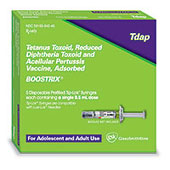November 5th, 2011 by Paul Auerbach, M.D. in Health Tips, News
1 Comment »

 Most of us are familiar with the need to achieve immunization against tetanus (“lockjaw”) and diphtheria. Fewer are familiar with the need to immunize against pertussis (“whooping cough”). Boostrix is a vaccine used to achieve immunity against all three. Until recently, there had not been a vaccine approved by the Food and Drug Administration (FDA) against pertussis intended for use in elders (ages 65 years and older). On July 8, 2011, the FDA approved Boostrix for use in this population of seniors.
Most of us are familiar with the need to achieve immunization against tetanus (“lockjaw”) and diphtheria. Fewer are familiar with the need to immunize against pertussis (“whooping cough”). Boostrix is a vaccine used to achieve immunity against all three. Until recently, there had not been a vaccine approved by the Food and Drug Administration (FDA) against pertussis intended for use in elders (ages 65 years and older). On July 8, 2011, the FDA approved Boostrix for use in this population of seniors.
The link to the FDA announcement is http://www.fda.gov/NewsEvents/Newsroom/PressAnnouncements/ucm262390.htm
Whooping cough is not a trivial disease. It is a highly communicable infectious disease caused by the bacterium Bordetella pertussis. It is transmitted by respiratory secretions or large droplets from the respiratory tract of an infected person. In children, whooping cough is typified by Read more »
This post, FDA Approves Tetanus/Diphtheria/Pertussis Vaccine For Adults Over 65, was originally published on
Healthine.com by Paul Auerbach, M.D..
June 16th, 2011 by Glenn Laffel, M.D., Ph.D. in Research
1 Comment »

In recent posts on Web-based and mobile behavioral intervention programs, we reviewed evidence suggesting that social support, in one form or another, can improve participants’ adherence and engagement with the program. That didn’t always mean however, that participants achieved better outcomes as a result. In one study for example, an online community increased engagement with and utilization of a Web-based activity program, but it did not increase participants’ actual activity levels.
 Another study, slightly older than the ones reviewed above, did show that a Web-based program improved outcomes. In this case, the intervention was an online videogame known as Re-Mission. Since I haven’t touched previously on outcome studies for automated lifestyle intervention tools or videogames as an example of such programs, I’ll do that here.
Another study, slightly older than the ones reviewed above, did show that a Web-based program improved outcomes. In this case, the intervention was an online videogame known as Re-Mission. Since I haven’t touched previously on outcome studies for automated lifestyle intervention tools or videogames as an example of such programs, I’ll do that here.
Re-Mission is intended improve medication compliance in teens and young adults with a history of cancer. In the game, players control a nanobot within a 3-dimensional body of a young person that has cancer. Play involves destroying cancer cells and managing chemotherapy-related adverse effects like vomiting and bacterial infections by using antiemetics and antibiotics. The game purports to help users understand Read more »
*This blog post was originally published at Pizaazz*
 Most of us are familiar with the need to achieve immunization against tetanus (“lockjaw”) and diphtheria. Fewer are familiar with the need to immunize against pertussis (“whooping cough”). Boostrix is a vaccine used to achieve immunity against all three. Until recently, there had not been a vaccine approved by the Food and Drug Administration (FDA) against pertussis intended for use in elders (ages 65 years and older). On July 8, 2011, the FDA approved Boostrix for use in this population of seniors.
Most of us are familiar with the need to achieve immunization against tetanus (“lockjaw”) and diphtheria. Fewer are familiar with the need to immunize against pertussis (“whooping cough”). Boostrix is a vaccine used to achieve immunity against all three. Until recently, there had not been a vaccine approved by the Food and Drug Administration (FDA) against pertussis intended for use in elders (ages 65 years and older). On July 8, 2011, the FDA approved Boostrix for use in this population of seniors.












